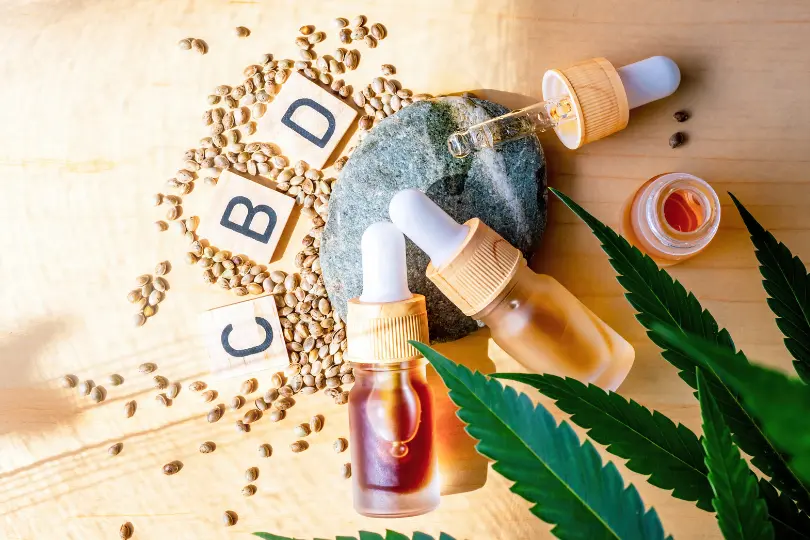
Are you feeling overwhelmed by the daily stresses of life?
Discover the potential stress-relieving benefits of CBD. Cannabidiol (CBD), a compound derived from the hemp plant, has gained significant attention for its therapeutic properties.
This article explores how CBD can help reduce your stress and promote a sense of calm.
What is CBD and how does it work?
CBD, short for cannabidiol, is one of the many compounds found in the cannabis plant. Unlike its psychoactive counterpart, THC, CBD does not produce a “high” sensation.
Instead, it interacts with the body’s endocannabinoid system (ECS), a complex network of receptors and neurotransmitters that help regulate various bodily functions, including stress and anxiety levels.
The ECS consists of two primary receptors: CB1 and CB2. CB1 receptors are primarily found in the brain and central nervous system, while CB2 receptors are mainly in the immune system. When CBD is consumed, it interacts with these receptors, promoting a sense of balance and homeostasis within the body.
The connection between stress and CBD
Stress is a natural response to challenging or threatening situations.
However, chronic stress can have detrimental effects on our overall well-being. When we experience stress, the body releases cortisol, a hormone that prepares us for the “fight or flight” response.
While cortisol is essential in short bursts, prolonged exposure to high cortisol levels can lead to various health problems, including anxiety, depression, sleep disturbances, and impaired immune function.
CBD has been found to have an impact on cortisol levels in the body. Research suggests that CBD may help reduce cortisol production, thus promoting a more relaxed and calm state.
By modulating the stress response, CBD can potentially help individuals manage stress more effectively and minimize its negative effects on both the mind and body.
Different forms of CBD for stress relief
Various CBD stores now carry CBD products, allowing you to choose the method that best suits your preferences and lifestyle.
Some common forms of CBD include:
- CBD oil: CBD oil is one of the most popular and versatile forms of CBD. It can be consumed sublingually (under the tongue), added to food or beverages, or applied topically. CBD oil is known for its fast-acting effects and high bioavailability.
- CBD capsules: CBD capsules offer a convenient and precise way to incorporate CBD into your daily routine. They are pre-dosed, making it easy to track your CBD intake. Capsules can take longer to take effect compared to CBD oil, as they need to be processed by the digestive system.
- CBD edibles: CBD-infused edibles, such as gummies, chocolates, and baked goods, provide a tasty and discreet way to consume CBD. Edibles are a popular choice for those who prefer a more enjoyable CBD experience.
- CBD topicals: CBD topicals, such as creams, lotions, and balms, are designed for localized application. They can be applied directly to the skin, targeting specific areas of discomfort or tension. CBD topicals are often used to relieve muscle soreness and promote relaxation.
- CBD vaping: CBD can also be inhaled through a vaporizer or vape pen. Vaping allows for quick absorption of CBD into the bloodstream, resulting in fast-acting effects. However, it’s important to note that the long-term effects of vaping are still being studied, and caution should be exercised when choosing this method.
How to incorporate CBD into your daily routine for stress management
Incorporating CBD into your daily routine for stress management is a personal choice that depends on your needs and preferences.
Here are some tips to help you get started:
- Start with a low dose: If you’re new to CBD, it’s advisable to start with a low dose and gradually increase it until you find the optimal dosage for your needs. This allows you to gauge how CBD affects your body and adjust accordingly.
- Create a consistent routine: Consistency is key when it comes to CBD. Incorporate CBD into your daily routine at the same time each day to establish a consistent schedule. This allows your body to become familiar with the effects of CBD and maximize its stress-relieving benefits.
- Keep a journal: Keeping a journal can help you track your CBD usage and its effects on your stress levels. Take note of the dosage, time of consumption, and any changes in your stress or anxiety levels. This can provide valuable insights into how CBD works for you and guide any necessary adjustments.
- Combine CBD with other stress management techniques: CBD can be a valuable addition to your stress management toolkit. However, it’s important to remember that it’s not a standalone solution. Combining CBD with other stress-reducing techniques, such as exercise, meditation, and healthy lifestyle habits, can further enhance its effectiveness.
Conclusion
CBD offers promising potential in reducing stress and promoting a sense of calm. Its interaction with the body’s endocannabinoid system and its ability to modulate cortisol levels make it an attractive option for individuals seeking natural stress relief.
With careful consideration and a holistic approach, CBD can become a valuable ally in your journey towards managing stress and promoting overall well-being.
About The Author:
Stacey Smith is a freelance health writer. She is passionate about writing about women’s health, dental health, diabetes, endocrinology, and nutrition and provides in-depth features on the latest in health news for medical clinics and health magazines.




